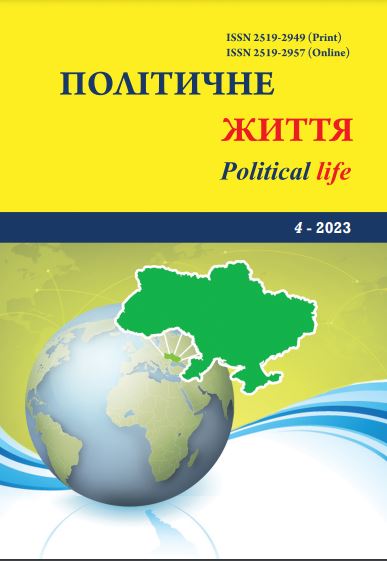Problems of training competitive intelligence specialists under martial law
DOI:
https://doi.org/10.31558/2519-2949.2023.4.4Keywords:
political situation; martial law; threats; challenges; personnel potential; educational activities; professional training; practical skillsAbstract
In the course of the study, the authors of the article analyzed the legislative framework regulating the training of competitive intelligence specialists. The specifics of such training in the conditions of martial law have been determined in view of the current legislation. Assessment of internal and external threats in the field of national security and defense was carried out. The destructive nature of the impact of these threats on the process of training competitive intelligence specialists under martial law conditions has been determined. The factors that have a destructive effect on the state of national security of Ukraine in the international arena as a whole and directly on the security of subjects of competitive intelligence in modern conditions are highlighted. Internal political threats to the security of subjects of competitive intelligence in the conditions of martial law are separated and analyzed. The peculiarities of the impact of modern threats on the objects of competitive intelligence, in particular as a result of cyber attacks by foreign special services, have been studied. The facts, events and risks associated with the specified cyber attacks are considered. The main problems of training employees of competitive intelligence have been determined in view of the aggravation of the military danger for Ukraine.
Studies have shown that during the full-scale invasion of the Russian Federation on the territory of Ukraine, the destruction of strategically important objects of the country’s critical infrastructure took on a massive scale. Undoubtedly, it becomes more and more difficult for employees of competitive intelligence to work in such conditions. The main task of the leadership of our state in such conditions should be to preserve the life and health of every citizen, in particular – employees of competitive intelligence performing professional tasks. In view of the identified problem, the question arises of finding new ways to improve the quality and efficiency of intelligence officers’ performance of state tasks in modern conditions, which directly depends on the level of their professional training, which is destructively affected by certain restrictions provided for by the conditions of martial law.
Based on the conducted research, it becomes clear that the quality and efficiency of tasks performed by subjects of competitive intelligence directly depends on the level of their professional training. In order to solve this problem, higher educational institutions participating in the training of these specialists should adapt the process of their training in accordance with the conditions of martial law. In particular, these institutions should organize and apply a more flexible training style for employees of competitive intelligence. This flexibility consists in the fact that specialists of competitive intelligence must first of all be trained in the practical plane, taking into account the nature of the exposed new challenges and threats to the national security of the state. In particular, employees of competitive intelligence should be trained to respond quickly and adequately to the changing situation in the world, on the basis of which they can make timely management decisions, provide the necessary recommendations to state bodies, and thus contribute to increasing the level of national security as a whole.
In view of the results of the research, the authors provided recommendations on taking into account certain features of the present in the course of training employees of competitive intelligence
in the conditions of martial law.
References
Про освіту : Закон України від 05.09.2017 р. № 2145-VIII. Голос країни. 2017. 27 верес. (№ 178-179). С.10–22.
Про наукову і науково-технічну діяльність : Закон України від 26.11.2015 р. № 848-VIII. Вісник Верховної ради. 2016, № 3, ст. 25.
Про організацію трудових відносин в умовах воєнного стану : Закон України від 01.07.2022 р. № 2352-IX. URL: https://zakon.rada.gov.ua/laws/show/2136-20#Text (дата звернення: 23.09.2023).
Про стратегію національної безпеки України : Указ Президента України від 14.09.2020 р. № 392/2020.
Про рішення Ради національної безпеки і оборони України від 4 червня 2021 року «Про невідкладні заходи щодо поглиблення інтеграції України до Організації Північноатлантичного договору» : Указ Президента України від 4.06.2021 р. № 307/2021.
Saveschools. URL: https://saveschools.in.ua/ (дата звернення: 18.10.2023).
Куйбіда В. С., Дегтярьова І. О., Петровський П. М. Публічне управління та адміністрування в умовах війни і в поствоєнний період в Україні. ДЗВО «Університет менеджменту освіти» НАПН України : зб. матеріалів доп. учасн. Всеукр. наук.-практ. конф. у трьох томах (м. Київ, 15-28 квітня 2022 р.).
Київ, 2022. 246 с.
Березіна Л.М., Братанов Б.В. Характерні особливості конкурентної розвідки та промислового шпигунства підприємств. Науковий економічний журнал «Інтелект ХХІ». Київ, 2020. Випуск № 2. С. 22 –27.
Балановська Т. І., Михайліченко М. В., Троян А. В. Сучасні технології управління персоналом: навч. посіб. Київ: ФОП Ямчинський О. В, 2020. 466 с.

